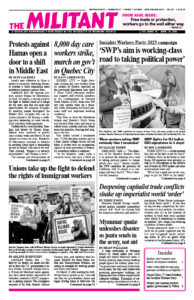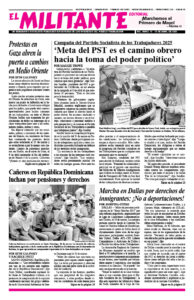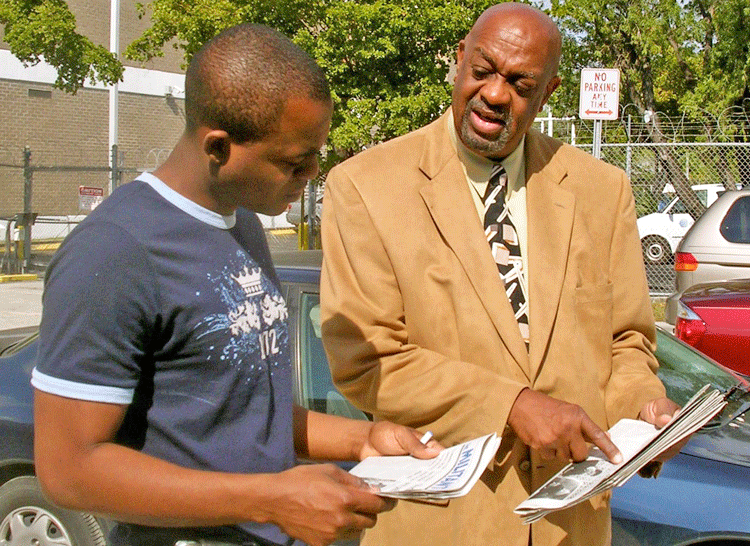WASHINGTON — A meeting organized by the branch of the Socialist Workers Party here was held March 22 to celebrate the life of Omari Musa, a veteran cadre of some 57 years building the communist movement in the U.S. and internationally.
Musa, elected to the SWP National Committee for 25 years by party conventions, died at age 80 on Feb. 22.
Musa joined the Young Socialist Alliance in 1968 in Ann Arbor, Michigan, where he was a graduate student in East Asian Studies, and the Socialist Workers Party a year later in the Bay Area. Refusing to accept the brutal injustices of capitalist exploitation and oppression, he was transformed by the historic battle led by working people who were Black that smashed Jim Crow segregation. While in Michigan, he traveled often to Detroit to work with the YSA and the party there. He saw firsthand the growing confidence and combativity of workers who were Black and the impact this had on the powerful industrial trade unions throughout the region.
He threw himself into building the mass movement against the U.S. rulers’ unsuccessful war to crush the Vietnamese Revolution, identified with Malcolm X, and learned from the Cuban toilers led by Fidel Castro as they took state power in 1959 and stood down the imperialist government in Washington determined to destroy them.
The meeting presented the history of the party and Musa’s decades of political contributions as a recommendation for today’s fighters — to follow his example. To build a revolutionary proletarian party strong enough and firm enough politically to lead working people to make a socialist revolution in the U.S., part of an expanding world socialist revolution. He understood that was the only way to stop the social convulsions and wars of imperialism today leading us toward fascism and an unthinkable World War III.

The meeting was chaired by Arlene Rubinstein, organizer of the Washington, D.C., SWP branch, who read a number of the messages sent to the meeting and welcomed the 80-plus participants — members and supporters of his party, those he worked and fought together with from the D.C. area and around the country, and young people interested in learning more about Musa and the SWP.
Musa’s sister, Sharon Worthy, came from New Orleans, where she and Omari grew up during the days of Jim Crow segregation. Among those in attendance were members of the DC Metro Coalition in Solidarity with the Cuban Revolution, which Musa helped found. Yasser Ibarra, first secretary of the Cuban Embassy attended and brought a message of appreciation for Omari’s work in defense of the Cuban Revolution.
A four-panel display prepared by the D.C. branch presented in photos and text the party’s work in the class struggle over the decades of Musa’s life and his contributions in leading that work.
The speakers included James Harris and Samir Hazboun, leaders of the SWP branch here, of which Musa was a member for the last 15 years of his life; Dave Prince, a longtime member of the party’s National Committee, who co-chaired the meeting; and Mary-Alice Waters, who spoke for the central leadership of the Socialist Workers Party.
They described how Musa became a communist, a Marxist and a proletarian internationalist.
Speakers and messages from around the country and the world described Musa’s warm personality, his love of jazz and his ready sense of humor, often put to good use in political work.
It was a meeting that looked back in order to look forward, as Musa recommended: “Join the Socialist Workers Party, there is no better place to be.”
Joined the SWP in 1969
“Omari joined the party in 1969 in the Bay Area and was the SWP candidate for governor of California in 1970,” Rubinstein said in opening the meeting. “He was an SWP candidate 19 times in numerous states, and here in D.C.”
“For Omari, popularizing the party’s program was a natural outgrowth of his activity. From his well-worn library he studied, read and reread Marxist classics and books by party leaders. At the top of his pile of books was Malcolm X, Black Liberation, and the Road to Workers Power, on the place of the struggle for Black liberation in the U.S. class struggle, and Malcolm X as an international leader of the working class. This was his book.”
“When Omari joined the party, he became a citizen of time, but always in the present, what is to be done, now,” said Prince. “We live in one of the great transition periods of human history. We face the reality of a bleak, capitalist world. But for the toilers, it’s a future of hope, the prospect of taking state power out of their hands and beginning to rebuild society on new foundations.
“Omari educated himself in communist continuity, going back to Marx and Engels, through the Russian Revolution led by Lenin, and through the fight led by Leon Trotsky against Stalinism, popular frontism and class collaboration, a fight that culminated on the eve of World War II in a struggle against a nonproletarian minority in the SWP.” That is the political current the SWP represents today, building a party that is proletarian in both program and composition.
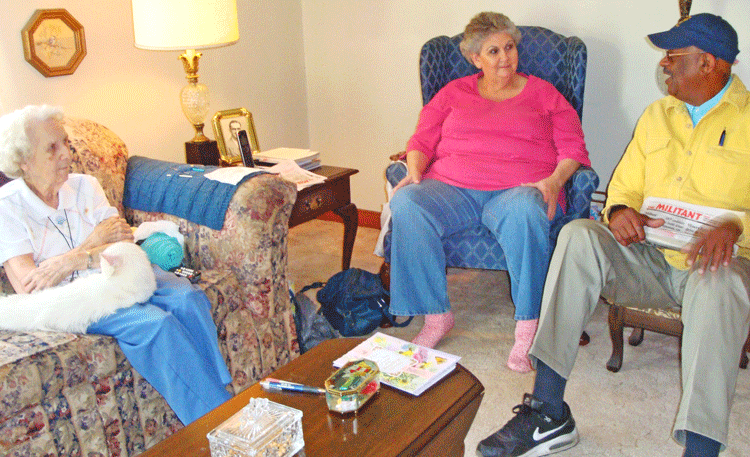
“Those currents — communists, Stalinists and social democrats,” Prince noted, remain the main political currents contesting today.
“Omari understood that the goal of party education is to train capable revolutionary politicians, not simply theoreticians,” Prince added.
Many of the messages described Musa as a popularizer of revolutionary politics, who often stepped into the breach as an effective, determined fighter in debates on a course of action.
Norton Sandler, a leader of the SWP in Los Angeles, wrote: “He set an example worth emulating of carrying out principled politics, while at the same time being able to work with trade union officials, with opponents from Stalinist and nationalist currents that defended the Cuban Revolution, in the National Black Independent Political Party and in other mass work.”
Turn to industrial unions
Musa also helped lead the party’s turn to the industrial unions beginning in 1978. Party members got jobs in union-organized coal mines, garment shops, auto plants and other industries, made possible by the changing consciousness and growing combativity in the working class being shaped by world events.
“The 1979 battle by 18,000 shipyard workers in Newport News, Virginia, for recognition of their Steelworkers Local 8888 and a union contract, was an example of these changes,” Harris said. “Black and Caucasian workers, led by a vanguard of Black workers, joined together to defeat a boss who expected to be able to use racial divisions to defeat the union. Omari was a member of the recently organized SWP branch there.
“Anyone who knew Omari for even a short time will have heard him tell the story of a Caucasian worker at the shipyard who ripped a Confederate flag patch off his jacket after union members beat back a full-blown cop riot against the strike headquarters and reestablished their picket line. ‘I won’t be wearing this anymore.’
“It is easy to forget or misunderstand the significance of this,” said Harris. “Now when you look at a picket line of Black and Caucasian workers standing together against the bosses, you don’t even think about it. But it took long and hard struggle, led by Black workers, to make that possible.”
“Omari helped recruit me to the party and to the working class,” said Samir Hazboun, who joined the SWP in 2018. “There’s no way to say thanks for that.”
Hazboun told the meeting how his description of the fight at Newport News impacted his co-workers at the cafeteria where he works. “Co-workers at the lunch table put down their phones and paid close attention as I described that unfolding battle,” he said. Two of his co-workers became interested in learning more and came to the meeting.
‘Malcolm X, Black Liberation, and the Road to Workers Power’
“No better tribute to Omari and the party he helped build for more than half a century can be found than in the introduction to Malcolm X, Black Liberation, and the Road to Workers Power by Jack Barnes, national secretary of the Socialist Workers Party,” said Mary-Alice Waters. At the close of her remarks she read the final paragraphs of that introduction. (See Related Articles in this issue.)
“Omari was continually broadening, deepening, sharpening his unshakable confidence in the working class and its capacity to lead a socialist revolution, transforming ourselves in the process,” Waters said. “He had a profound understanding, based on his own life experience of the fight for Black liberation as an inseparable part of the road to workers power. He knew how much stronger the U.S. working class is today as a result of the battles that smashed Jim Crow.
“As I was thinking about Omari’s leadership contributions, I was reminded of a poem by German playwright Bertolt Brecht, ‘In Praise of the Fighters,’ later made famous in a song by Cuban troubadour Silvio Rodríguez,” she said. “Fights advance through the contributions of many, says the poem, but there are those who fight for a lifetime, and ‘these are the indispensable ones.’
“Omari can truly be counted as among the indispensable ones,” Waters said.
Break with Stalinism
“Omari’s break with Stalinism was an important and necessary part of his political development in the party,” Waters said. “Like many others at the time, he was initially attracted to the Chinese Revolution and its aura of representing rising ‘Third World’ peoples oppressed by imperialism.
“Omari got a real education in the reactionary character of Maoism when he moved to the Bay Area later in 1969, where several campuses were the site of pitched battles between Maoist groups determined to physically take over the Third World Studies departments then being established, and other students and professors determined to prevent that from happening,” she said.
“The Maoist groups were dominated by violent thugs, inspired by the so-called ‘Great Proletarian Cultural Revolution’ unfolding in China. The SWP was the only party that could explain the Stalinist character of the Maoist leadership and its acolytes around the world, whose violent, ultraleft, anti-working-class politics influenced the Black Panther Party, the Weathermen, a section of the anti-Vietnam War movement and others headed away from the working class.
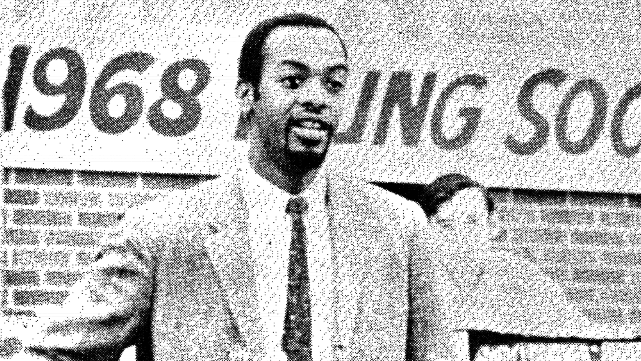
“Without understanding Omari’s break with Maoism, you can’t fully appreciate his proletarian internationalism,” said Waters, “and how he learned that there can be no revolutionary course that doesn’t start with the world — and the working class. This was in Omari’s bones.”
Omari was comfortable working with co-workers of all races, colors and national origins, she said. She cited one of the messages sent to the meeting about how Omari “would sit down at any table in a break room at work in a meatpacking plant with a large number of immigrant workers from all over the world, smile and say ‘hello’ in whatever language was being spoken — Chinese, Spanish, Vietnamese, Portuguese, English or whatever. Well over 6 feet tall, he made everyone, including his co-workers who were women, feel at ease.
“In the last 25 years, Omari was deeply involved in leading the SWP’s work in defense of the Cuban Revolution, first in Miami and then Washington, D.C.,” Waters said. He readily accepted party assignments that often took him to Cuba, Venezuela, Lebanon and other countries around the world to participate in conferences, brigades, union gatherings and other Cuba solidarity events.
In 2008, at the invitation of Víctor Dreke, Cuba’s ambassador to Equatorial Guinea at the time, Musa participated in a trip there. In a message to the meeting Dreke and Dr. Ana Morales recalled that visit, writing of Musa’s “ability to absorb everything that was happening there.”
The meeting closed with a fund appeal for the Socialist Workers Party by Rubinstein, which won $5,018 in contributions and pledges. She thanked the supporters of the Socialist Workers Party in D.C. for the delicious spread of food, and thanked the Silver Spring Civic Center for welcoming the party to this venue.
Participants stayed for over an hour after the meeting to talk with each other, continue reading the displays and book of messages and listen to some great jazz.
